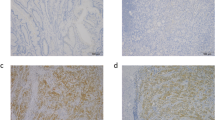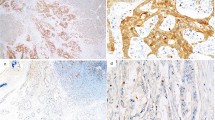Abstract
Transmembrane protease, serine 4 (TMPRSS4), is a novel type II transmembrane serine protease that is highly expressed on the cell surface in pancreatic, thyroid, lung, and other cancer tissues, although its oncogenic significance and molecular mechanisms are unknown. In a series of 109 primary breast cancer patients, we performed a comprehensive analysis of TMPRSS4 expression using immunohistochemistry. The relationship between TMPRSS4 expression and the clinicopathological characteristics or prognosis was evaluated. Results showed that breast cancer tissues exhibited higher levels of TMPRSS4 expression compared with benign tissues (65.1 versus 17.5 %, P < 0.001). High expression of TMPRSS4 was significantly correlated with lymph node metastasis (P < 0.001), high pathological grade (P = 0.001), and tumor size >2 cm (P = 0.006), but not correlated with other clinicopathological parameters, including the patient’s age (P = 0.289), menopausal status (P = 0.300), histological subtype (P = 0.418), and status of estrogen receptor (ER) (P = 0.913), progesterone receptor (PR) (P = 0.247), and HER-2 (P = 0.882). Patients with high expression of TMPRSS4 had shorter OS and DFS than those with low expression (P = 0.0009 and P = 0.0044, respectively). TMPRSS4 expression and lymph node metastasis were independent prognostic factors for both OS and DFS by multivariate analysis. Based on our results, we propose TMPRSS4 as a putative biological marker for breast cancer and as an indicator of poor prognosis.


Similar content being viewed by others
References
Jemal A, Bray F, Ferlay J, Ward E, Forman D. Global cancer statistics. CA Cancer J Clin. 2011;61(2):69–90.
Wei G, Wang Y, Zhang P, Lu J, Mao JH. Evaluating the prognostic significance of FBXW7 expression level in human breast cancer by a meta-analysis of transcriptional profiles. J cancer sci ther. 2012;4(9):299–305.
Dechaphunkul A, Phukaoloun M, Kanjanapradit K, Graham K, Ghosh S, Santos C, et al. Prognostic significance of tissue inhibitor of metalloproteinase-1 in breast cancer. Int J breast cancer;2012:290854.
Netzel-Arnett S, Hooper JD, Szabo R, Madison EL, Quigley JP, Bugge TH, et al. Membrane anchored serine proteases: a rapidly expanding group of cell surface proteolytic enzymes with potential roles in cancer. Cancer metastasis rev. 2003;22(2–3):237–58.
Wallrapp C, Hahnel S, Muller-Pillasch F, Burghardt B, Iwamura T, Ruthenburger M, et al. A novel transmembrane serine protease (TMPRSS3) overexpressed in pancreatic cancer. Cancer Res. 2000;60(10):2602–6.
Kebebew E, Peng M, Reiff E, Duh QY, Clark OH, McMillan A. ECM1 and TMPRSS4 are diagnostic markers of malignant thyroid neoplasms and improve the accuracy of fine needle aspiration biopsy. Ann Surg. 2005;242(3):353–61. discussion 61–3.
Jung H, Lee KP, Park SJ, Park JH, Jang YS, Choi SY, et al. TMPRSS4 promotes invasion, migration and metastasis of human tumor cells by facilitating an epithelial-mesenchymal transition. Oncogene. 2008;27(18):2635–47.
Kim S, Kang HY, Nam EH, Choi MS, Zhao XF, Hong CS, et al. TMPRSS4 induces invasion and epithelial-mesenchymal transition through upregulation of integrin alpha5 and its signaling pathways. Carcinogenesis. 2010;31(4):597–606.
Larzabal L, Nguewa PA, Pio R, Blanco D, Sanchez B, Rodriguez MJ, et al. Overexpression of TMPRSS4 in non-small cell lung cancer is associated with poor prognosis in patients with squamous histology. Br J Cancer. 2011;105(10):1608–14.
Li T, Zeng ZC, Wang L, Qiu SJ, Zhou JW, Zhi XT, et al. Radiation enhances long-term metastasis potential of residual hepatocellular carcinoma in nude mice through TMPRSS4-induced epithelial-mesenchymal transition. Cancer Gene Ther. 2011;18(9):617–26.
Grutzmann R, Pilarsky C, Ammerpohl O, Luttges J, Bohme A, Sipos B, et al. Gene expression profiling of microdissected pancreatic ductal carcinomas using high-density DNA microarrays. Neoplasia. 2004;6(5):611–22.
Iacobuzio-Donahue CA, Ashfaq R, Maitra A, Adsay NV, Shen-Ong GL, Berg K, et al. Highly expressed genes in pancreatic ductal adenocarcinomas: a comprehensive characterization and comparison of the transcription profiles obtained from three major technologies. Cancer Res. 2003;63(24):8614–22.
Ma XJ, Patel R, Wang X, Salunga R, Murage J, Desai R, et al. Molecular classification of human cancers using a 92-gene real-time quantitative polymerase chain reaction assay. Arch Pathol Lab Med. 2006;130(4):465–73.
Bener A, Ayub H, Kakil R, Ibrahim W. Patterns of cancer incidence among the population of Qatar: a worldwide comparative study. Asian Pac J Cancer Prev: APJCP. 2008;9(1):19–24.
Bener A, El Ayoubi HR, Basha B, Joseph S, Chouchane L. Breast cancer screening barriers: knowledge, attitudes and practices of women toward breast cancer. Breast J. 2011;17(1):115–6.
Huang CS, Chang KJ, Shen CY. Breast cancer screening in Taiwan and China. Breast dis. 2001;13:41–8.
Weigel MT, Dowsett M. Current and emerging biomarkers in breast cancer: prognosis and prediction. Endocr Relat Cancer. 2010;17(4):R245–62.
Thiery JP, Sleeman JP. Complex networks orchestrate epithelial-mesenchymal transitions. Nat Rev Mol Cell Biol. 2006;7(2):131–42.
Yang J, Weinberg RA. Epithelial-mesenchymal transition: at the crossroads of development and tumor metastasis. Dev Cell. 2008;14(6):818–29.
Acknowledgments
This work was supported by a grant from the Liaoning Nature Science Fund (201102279).
Conflict of interest
The authors declare that they have no conflict of interest relating to the publication of this manuscript.
Author information
Authors and Affiliations
Corresponding author
Rights and permissions
About this article
Cite this article
Liang, B., Wu, M., Bu, Y. et al. Prognostic value of TMPRSS4 expression in patients with breast cancer. Med Oncol 30, 497 (2013). https://doi.org/10.1007/s12032-013-0497-8
Received:
Accepted:
Published:
DOI: https://doi.org/10.1007/s12032-013-0497-8




